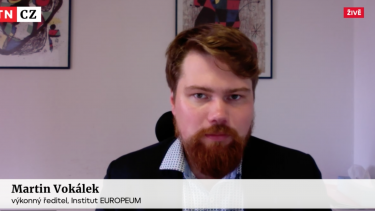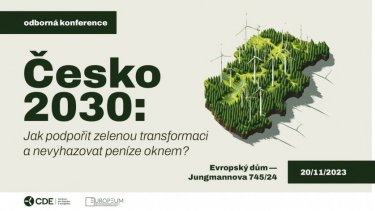WhatNews | Cities are expecting another heat wave this year. What is Prague doing to keep us from getting baked?
The average temperature in the Czech Republic has increased by 2.2 degrees Celsius since the 1960s. As a result of climate change, the country is suffering more frequent weather extremes: torrential rain, drought and heat. Heat waves are particularly severe in heat islands that form in cities. Prague wants to rapidly reduce greenhouse gas emissions, add greenery and water features. Will it be enough? Katarina Svitková, an Associate Research Fellow at EUROPEUM Institute gives examples to WHAT news on how Barcelona is adapting to the heat.
Show more
TN Live | EU has approved further sanctions. They target the Russian industry and energy sector
European Union has approved its fourteenth package of sanctions against Russia, specifically targeting 116 additional individuals. Whom will the new package of sanctions affect the most? How effective have previous packages been so far? Martin Vokálek, Executive Director of EUROPEUM Institute, answered these questions live for TN Live.
Show more
Czech Republic 2030: How to support green transformation and not throw money out the window?
On 20 November 2023, the Centre for Transport and Energy, in cooperation with EUROPEUM Institute for European Policy, organised a conference entitled Czech Republic 2030: how to support green transformation and not throw money out the window? The conference was opened with an introduction by Josef Schwarz from the Representation of the European Commission in the Czech Republic.
Show moreTV Nova | Czech Republic drew the most money from EU funds for transport
The Czech Republic uses the most money from EU funds for the reconstruction of railway stations, new railway corridors or new motorways. At the same time, traffic is continuously increasing and in some places the capacity is no longer sufficient. Rebeka Hengalová, researcher at EUROPEUM Institute, commented on this issue for the main evening broadcast of TV Nova.
Show moreBlog | Prague passable - or clogged? The dilemma of sustainable transport in the city
Prague faces increasing dependence on intensive car traffic, leading to growing problems with traffic, parking and deteriorating quality of public space. The increased number of vehicles means not only pressure on safety and traffic fluidity, but also environmental risks associated with internal combustion engines. Despite growing public support for public transport and car traffic regulation, finding a compromise between individual convenience and urban sustainability remains a challenge.
Show more
Op-Ed | The grain dispute is the first sign that Ukraine's EU accession will not be easy. What obstacles await on this path?
The Ukrainian grain situation is making waves in Europe. Deputy Director and Head of the Brussels Office Ziga Faktor wrote an Op-Ed about the impact of the situation on the country's EU accession and how some member states are reacting.
Show more
REPORT | EU-Pacific Talks: In-EV-itable future of automotive industry: what is the role of the Pacific region
In the last debate of the second series of EU-Pacific Talks, organised by EUROPEUM Institute for European Policy, the guests focused on electric and fuel cell vehicles, which are envisaged as a way to decarbonise road transport. Read what our guests discussed in this report by Petra Pospíšilová.
Show moreEU-Pacific Talks: In-EV-itable future of automotive industry: what is the role of the Pacific region
We would like to invite you to the debate called "EU-Pacific Talks: In-EV-itable future of automotive industry: what is the role of the Pacific region" in the EU-PACIFIC Talks series. The debate will take place online on Tuesday, May 30 at 13:00.
Show more
National Convention on the EU | Background material: The European Political Community and its future potential
Our Senior Research Fellow Jana Juzová, Associate Research Fellow Zuzana Kasáková and Head of the Brussels Office Žiga Faktor prepared the background material for the roundtable of the National Convention on the EU. The topic is "The European Political Community and its future potential". Three main questions are put to the roundtable: What potential does the European Political Community offer and how can it complement existing platforms and processes? In which areas of cooperation does the platform have the greatest potential and what should it focus on? What format and modus operandi would be most beneficial for the Platform to fulfil its purpose?
Show more

Prague Climate Academy
In 2023, the Green Europe team of EUROPEUM Institute for European Policy introduced a series of workshops aimed at communicating the topic of green transformation to the Czech public. The aim is to support journalists and civil society in developing public discourse on climate change and climate policies. Last year, the Prague Climate Academy focused on sustainability in transport. The topic of the first workshop was the decarbonisation of car transport in the context of electromobility. The second workshop focused on transport sustainability in the city of Prague. In 2024, we are following up with the topic of city adaptation to climate change. We will offer a series of discussions and workshops with experts on public space adaptation, blue-green measures, and public participation.
Show more

Staroměstské náměstí 4/1
Prague 1 - Staré Město
110 00
tel.: +420 212 246 552
email: europeum@europeum.org
https://www.europeum.org









